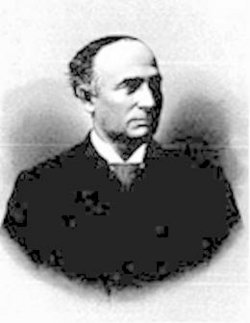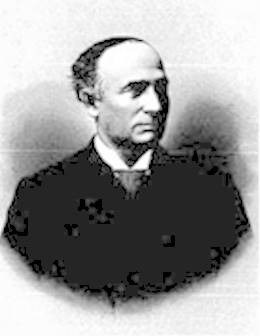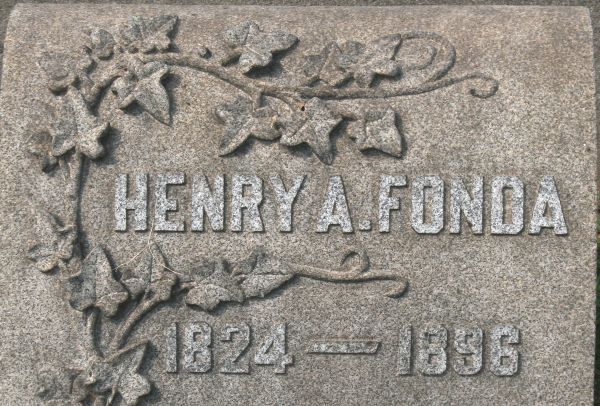Upon leaving it he engaged with the Canandaigua and Niagara Falls road, as superintendent of construction and repairs. After filling this post two years he removed to Pennsylvania and accepted the position of superintendent of construction on the Catawissa railroad, then thirty-five miles in extent. After being promoted to the position of assistant superintendent, and being advanced from that office to the responsible post of general superintendent of the road, he closed his connection with it (then of five years' duration), to accept the office of general superintendent of the Elmira and Williamsport railroad, to the duties of which he devoted the ensuing three years. In 1864 he became general superintendent of the Lackawanna and Bloomsburg railroad, then under control of the Delaware and Western Railroad Company.
After serving this corporation five years he took a contract to build a railroad from Carbondale to Susquehanna. This contract being completed he took service with the Delaware and Hudson railroad, as general superintendent, and was placed in charge of all the lines of this large corporation from Carbondale, Pa., to Whitehall and Rutland, Vt. At the expiration of four years' steady service under this company, he retired from active duty and took up his residence in Philadelphia, where he spent several years. In 1887 he removed to Milton, where he established a permanent residence. Having definitely relinquished engineering pursuits, he turned his attention to farming and stock-raising. He is now the owner of a large stock farm and residence on Cayuga lake, near Aurora, and also of five extensive stock farms in the vicinity of Milton. His barn on the largest farm on Cayuga Lake is the finest in the state.
Mr. Fonda has paid particular attention to the breeding of Hambletonian stock and has raised many notable specimens of this strain. His success in this later departure in farming and stock-raising is extremely gratifying to him. In them he finds agreeable and interesting relaxation, which is both welcome and beneficial after so many years of active and absorbing railroad life. Since 1885 Mr. Fonda has been president of the First National Bank of Milton, and he divides his time between his duties as a financier and the agreeable occupation of a "gentleman farmer." His habits are those of a thorough business man, everything confided to his charge being attended to thoroughly and with the strictest regard for the interest of others, as well as respect for their rights.
At a time when real estate in Chicago was low in value and on the rise, he invested largely in property in that city, and has reaped a rich reward as a result of his enterprise and sagacity in this field. After the disastrous conflagration which in 1880 destroyed so large an amount of property in Milton, Mr. Fonda promptly loaned quite an amount of money to rebuild the place, and through this wise and timely action on his part it has rapidly recovered from the damaging blow it sustained, and is making rapid strides to a more prosperous and advanced condition. His public spirited action in this and other matters has had a weighty influence upon the business interests of Milton, and has earned for him a reward in the general prosperity which gratifies him far more than any pecuniary advantage he may eventually reap in consequence. Mr. Fonda started in life without means and has reached his present financial independence and leading position as a citizen, solely through his own unaided enterprise and ability. So far from this fact operating to close his heart to the claims of his less fortunate fellowmen, it seems to exert just the contrary effect, for it is well known that many who were struggling have been helped by his generosity, extended willingly and from a sense of duty as a steward of wealth,rather than through any desire for notoriety or subsequent reward. Men gifted with such admirable qualities raise the standard of life and living, both for themselves and all who dwell within reach of their influence, and may justly be styled the pillars of the community - the strong supports of the higher ideas of duty and citizenship prevailing in a free and enlightened country. Every dollar of Mr. Fonda's wealth has been amassed by straightforward business operations. Disdaining sharp practices and resolutely declining them, he nevertheless acquired means far in excess of many who descended to petty if not more culpable methods.
He lives in a manner commensurate with his ample fortune and social position, and not the least of his satisfaction is the consciousness that his success with all that it brings, is the outcome of an upright business life. His farms adjoining the town of Milton, containing in all 700 acres, are models, and upon them is to be found some of the finest stock in the state. In addition to his connection with the First National Bank, he is a director in several other banks, and also of the Elmira and Williamsport railroad company. He has never accepted any political office nor had any aspirations in that direction, but held a commission as colonel on Governor Pollock's staff during his term as governor of the state of Pennsylvania. Modest and retiring in disposition, he avoids rather than courts notoriety, although never withholding his name or influence from any enterprise having for its object the benefit of mankind. His charities are bestowed quietly, and to many he has been a true friend in times of panic and distress.
Mr. Fonda married, on January 1, 1862, Miss Caroline Louisa Brown, daughter of Isaac Brown, a prominent merchant of Milton. His only child, a son, Lawrence B. Fonda, who was educated at the University of Pennsylvania in Philadelphia, has recently joined the Sons of the Revolution through that patriotic record which has been so faithfully won by his ancestors. Mr. Fonda's grandfather (Henry Fonda) served as a captain in the War of 1812, and his great-grandfather (Adam Fonda) was lieutenant-colonel under General Herkimer at the Oriskany battle. Adam Fonda was a son of Douw Fonda, who was slain by the Tories during Sir John Johnson's raid in 1780. What a debt our country owes to this ancient patriotism!
Upon leaving it he engaged with the Canandaigua and Niagara Falls road, as superintendent of construction and repairs. After filling this post two years he removed to Pennsylvania and accepted the position of superintendent of construction on the Catawissa railroad, then thirty-five miles in extent. After being promoted to the position of assistant superintendent, and being advanced from that office to the responsible post of general superintendent of the road, he closed his connection with it (then of five years' duration), to accept the office of general superintendent of the Elmira and Williamsport railroad, to the duties of which he devoted the ensuing three years. In 1864 he became general superintendent of the Lackawanna and Bloomsburg railroad, then under control of the Delaware and Western Railroad Company.
After serving this corporation five years he took a contract to build a railroad from Carbondale to Susquehanna. This contract being completed he took service with the Delaware and Hudson railroad, as general superintendent, and was placed in charge of all the lines of this large corporation from Carbondale, Pa., to Whitehall and Rutland, Vt. At the expiration of four years' steady service under this company, he retired from active duty and took up his residence in Philadelphia, where he spent several years. In 1887 he removed to Milton, where he established a permanent residence. Having definitely relinquished engineering pursuits, he turned his attention to farming and stock-raising. He is now the owner of a large stock farm and residence on Cayuga lake, near Aurora, and also of five extensive stock farms in the vicinity of Milton. His barn on the largest farm on Cayuga Lake is the finest in the state.
Mr. Fonda has paid particular attention to the breeding of Hambletonian stock and has raised many notable specimens of this strain. His success in this later departure in farming and stock-raising is extremely gratifying to him. In them he finds agreeable and interesting relaxation, which is both welcome and beneficial after so many years of active and absorbing railroad life. Since 1885 Mr. Fonda has been president of the First National Bank of Milton, and he divides his time between his duties as a financier and the agreeable occupation of a "gentleman farmer." His habits are those of a thorough business man, everything confided to his charge being attended to thoroughly and with the strictest regard for the interest of others, as well as respect for their rights.
At a time when real estate in Chicago was low in value and on the rise, he invested largely in property in that city, and has reaped a rich reward as a result of his enterprise and sagacity in this field. After the disastrous conflagration which in 1880 destroyed so large an amount of property in Milton, Mr. Fonda promptly loaned quite an amount of money to rebuild the place, and through this wise and timely action on his part it has rapidly recovered from the damaging blow it sustained, and is making rapid strides to a more prosperous and advanced condition. His public spirited action in this and other matters has had a weighty influence upon the business interests of Milton, and has earned for him a reward in the general prosperity which gratifies him far more than any pecuniary advantage he may eventually reap in consequence. Mr. Fonda started in life without means and has reached his present financial independence and leading position as a citizen, solely through his own unaided enterprise and ability. So far from this fact operating to close his heart to the claims of his less fortunate fellowmen, it seems to exert just the contrary effect, for it is well known that many who were struggling have been helped by his generosity, extended willingly and from a sense of duty as a steward of wealth,rather than through any desire for notoriety or subsequent reward. Men gifted with such admirable qualities raise the standard of life and living, both for themselves and all who dwell within reach of their influence, and may justly be styled the pillars of the community - the strong supports of the higher ideas of duty and citizenship prevailing in a free and enlightened country. Every dollar of Mr. Fonda's wealth has been amassed by straightforward business operations. Disdaining sharp practices and resolutely declining them, he nevertheless acquired means far in excess of many who descended to petty if not more culpable methods.
He lives in a manner commensurate with his ample fortune and social position, and not the least of his satisfaction is the consciousness that his success with all that it brings, is the outcome of an upright business life. His farms adjoining the town of Milton, containing in all 700 acres, are models, and upon them is to be found some of the finest stock in the state. In addition to his connection with the First National Bank, he is a director in several other banks, and also of the Elmira and Williamsport railroad company. He has never accepted any political office nor had any aspirations in that direction, but held a commission as colonel on Governor Pollock's staff during his term as governor of the state of Pennsylvania. Modest and retiring in disposition, he avoids rather than courts notoriety, although never withholding his name or influence from any enterprise having for its object the benefit of mankind. His charities are bestowed quietly, and to many he has been a true friend in times of panic and distress.
Mr. Fonda married, on January 1, 1862, Miss Caroline Louisa Brown, daughter of Isaac Brown, a prominent merchant of Milton. His only child, a son, Lawrence B. Fonda, who was educated at the University of Pennsylvania in Philadelphia, has recently joined the Sons of the Revolution through that patriotic record which has been so faithfully won by his ancestors. Mr. Fonda's grandfather (Henry Fonda) served as a captain in the War of 1812, and his great-grandfather (Adam Fonda) was lieutenant-colonel under General Herkimer at the Oriskany battle. Adam Fonda was a son of Douw Fonda, who was slain by the Tories during Sir John Johnson's raid in 1780. What a debt our country owes to this ancient patriotism!
Family Members
Advertisement
Records on Ancestry
Advertisement













